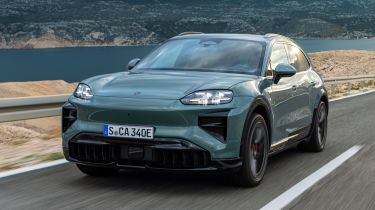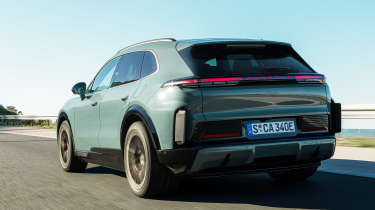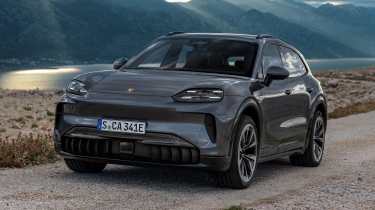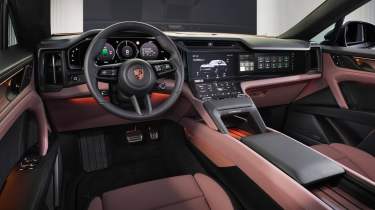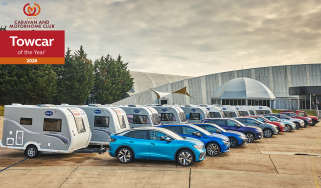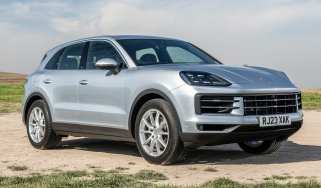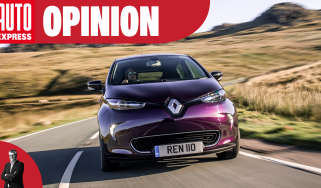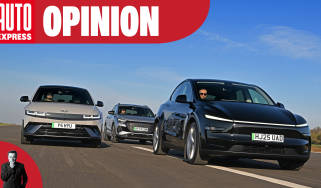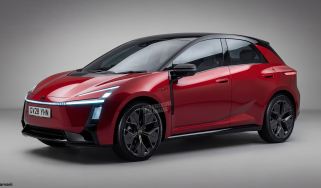New Porsche Cayenne Electric storms in with 911 Turbo-rivalling performance
The arrival of the all-electric Porsche Cayenne doesn’t signal the demise of the petrol-powered model as the brand aims to sell both
As Porsche’s first SUV, the Cayenne marked a significant step 22 years ago and now there’s another important milestone - the first all-electric Cayenne.
Named simply Porsche Cayenne Electric, the EV sits alongside the Macan Electric and the Taycan in Porsche’s three-strong, all-electric line-up. Despite having only just been revealed, two versions of the Cayenne Electric are available to order now, priced from £83,200 in standard guise or £130,900 for the Turbo.
The arrival of the Cayenne Electric doesn’t mean the end for the internal combustion-engined model either. Porsche aims to offer a choice of ICE or EV powertrains with its current models, and the current Cayenne is set to be updated in the future. “We will continue to develop the Cayenne with efficient combustion and hybrid drive systems well into the next decade," says Porsche’s Matthias Becker, Member of the Board of Management.
Sitting on a variant of the Volkswagen Group’s 800V PPE (Premium Platform Electric) architecture shared with the Macan Electric, the Cayenne Electric comes with a whopping 113kWh battery. This means the standard car claims a 398-mile maximum range, while the Turbo tops out at 387 miles. Charging speeds of up to 400kW result in a 10 to 80 per cent top-up can take less than 16 minutes, Porsche claims, while the Cayenne Electric can also recoup more than 200 miles of range in 10 minutes.
Topping up that big battery doesn’t have to be done via a cable, either, at least not one connected to the car. The Cayenne Electric also supports inductive charging, meaning you can park it over a wireless charging pad to top up the battery. The wireless charging floor plate weighs 50kg, measures 117cm by 78cm, and stands 6cm tall - but its maximum charge speed of 11kW won’t give a particularly rapid charge, however. Plus, to accept wireless charging, the Cayenne Electric will also need to be fitted with special hardware (which can be done via any Porsche Centre).
Can't wait for the new Cayenne Electric? You can buy a used Porsche Cayenne through our Buy a Car service, with prices starting from less than £13,000.
How fast is the new Porsche Cayenne Electric?
Although it’s an electric car, the Cayenne Electric is also a Porsche, so its performance is extremely important. Both versions come with all-wheel drive from dual-motor set-ups, but while the standard car gets an impressive 435bhp and 835Nm of torque, the Turbo gets a massive 1,139bhp and 1,500Nm of torque. To get that maximum figure you have to press the ‘Push-to-pass’ function, which adds the final 176bhp for 10 seconds - although we imagine you’ll have no problem overtaking with the standard output.
In regular guise, the Cayenne Electric dispatches the 0-62mph sprint in 4.8 seconds and tops out at 143mph. The Turbo manages the same benchmark in 2.5 seconds before reaching a 162mph top speed - meaning that despite the almost three-tonne kerbweight, the Cayenne Electric Turbo matches the new 911 Turbo S’s acceleration.
With all that power and weight, the Cayenne’s towing ability is pretty punchy too. Porsche has confirmed that the car will be rated to haul a braked trailer of up to 3.5 tonnes. This is the highest of any current EV sold in the UK. There are lots of petrol and diesel-powered tow cars to choose from that’ll tow that amount (like the Land Rover Discovery and Toyota Land Cruiser).
We’ve already experienced the new Cayenne Electric from the passenger seat, but the firm has thrown as much technology as it could at the electric SUV to make sure it drives like a Porsche too. Porsche Active Suspension Management (PASM) is fitted as standard on both models, and there’s a torque vectoring limited-slip rear differential on the Turbo model. Both cars also get rear-wheel steer (turning up to five degrees) and Porsche’s ‘Active Ride’, which helps compensate for body movements under acceleration, deceleration and cornering for a smoother ride.
New Porsche Cayenne Electric design and space
Then there’s the design. Teased several times ahead of this reveal, the final look is pretty recognisable alongside the Taycan and Macan Electric. The Cayenne Electric gets a similar quad-LED headlight arraignment, lots of vanes in the lower section of the bumper to guide air (like the current 911), no upper grille, simple surfacing on the body, and around to the rear a full-width LED lightbar broken up by illuminated ‘Porsche’ lettering.
Distinct features include frameless doors, a two-tone body, a range of aero-optimised wheels from 20-inch to 22-inch, 13 exterior standard paint colours and adaptive aerodynamics within the nose and the roof spoiler. Speaking of aerodynamics, the Cayenne Electric’s drag coefficient stands at 0.25 - a whole 0.1 better than the petrol car.
That’s bearing in mind the EV is bigger than the ICE car too. At 4,985mm, it’s 55mm longer than the combustion-engined Cayenne while also being 1,980mm and 1,674mm tall (15cm shorter than the ICE car). Porsche says an increase of 13cm in wheelbase means rear passengers will have more legroom than in any previous version of the Cayenne.
In fact, practicality as a whole will be improved. under the bonnet there’s a 90-litre ‘frunk’, while the boot capacity of 781 litres rises to 1,588 litres with the rear seats folded.
Porsche Cayenne Electric interior: curved OLED screens and plenty of tech
Inside the Cayenne, the dash is taken up by digital displays. The main ‘Flow Display’ is the most dramatic, because it doesn’t just occupy the centre space in the dash, but is also bent at its base to follow the contours of the centre console.
This is the first car to feature a centre console touchscreen with a sharply curved element, although it’s not the first curved OLED screen unit in a car – these are already used across the BMW range and Porsche’s other models.
To one side of this is an optional 14.9-inch passenger display, and when equipped with the main Flow Display it creates a wall of digital real estate that can be customised by those in the front row. The home screen will house the main map display, with the curved section at its base featuring configurable tiles that can control your phone or media and provide other shortcuts.
It’s also here that the screen houses some key air-conditioning controls, but Porsche has retained physical knobs for the temperature and fan speed. You’ll also spot a physical volume roller down there for the stereo.
This main display is integrated into the dashboard with a palm rest underneath the lower section of the screen that should make it easier to use while driving. Below this is storage, and a wireless phone charger.
In front of the driver is another curved display, this time 14.5 inches in size with touch-sensitive areas around its edge. These are largely to house controls for the chassis, lighting, suspension and parking cameras.
Finally, Porsche has also integrated a new augmented reality-heads-up display, which brings the total screen area in the car up to 87 inches. This is capable of overlaying various information, including direction arrows, onto the road ahead.
Get the latest and best car news and reviews, first! Follow Auto Express on Google today

